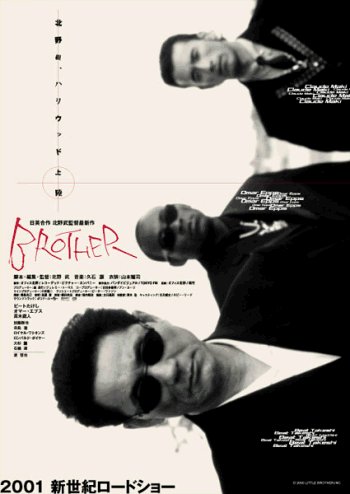American Yakuza - - Brother
Genre: Crime/action/drama
Grade = B+

Takeshi Kitano Kikujiro and Sanotine) who acts under the name ‘Beat’ Takeshi directs this attempt
to enter into the American market.
Takeshi’s character is Yamamoto, an upper level captain in a small Yakuza organization in Japan that is currently at war with another gang. The elder of the gang is assassinated and the police force the gangs to integrate. One of the other captains is ordered to kill Yamamoto whom the other gang view as a threat. Instead he fakes his death and gives him a false identity and money to leave the country. Yamamoto flies to LA to meet with his younger brother. Instead of finding him going to college, he finds him a low-level drug dealer with a small gang of four. They call him Aniki (brother). One of the members is Denny (Omar Epps) who he first meets immediately on his arrival in LA when he accidently bumps into him causing Denny to break his bottle of wine. Denny demands that he pay an inordinate amount to replace it, Yamamoto responds by stabbing him in the face with the broken bottle. Nice guy.
When a Aniki finds another drug dealer pushing around his brother he responds immediately, he beats the hell out of him. When the dealer and his gang comes after him for revenge, he calmly kills them all. He decides that it will be a good idea to take over their territory. He is soon joined in LA by his trusted lieutenant (Ryo Ishibashi) and he soon has his little brother and his friends acting like Yakuza, including having them stand in a line to the side waiting to serve their Yakuza sempai (senior), a ritual that young Yakuza wannabes are required to do while apprenticing. He cuts his way through all opposition and establishes himself as a power in the city underworld.
This is a typical Takeshi film. It is extremely minimalist with inordinately little dialog with a montage of fundamentally silent images and scenes. There is extreme and bloody violence interspersed with great humor. Unlike most other films, the violence is not gratuitous, instead, everyone pretty much dies for a specific reason and these acts generally advance the storyline. As with Takeshi’s other Yakuza films it is filled with traditional ideas of Yakuza personal honor, loyalty, respect, brotherhood and sacrifice for the good of the group.
The main character's name Yamamoto is of particular significance. Yamamoto Tsunetomo was a 18th century samurai who wrote the book Hagakure (the way of the samurai). Written during the Tokugawa era (1601-1868), it extolled the code of bushido - the way of the warrior, that extolled martial values of loyalty to one's lord and comrades, stoic courage, and personal alturism. In fact, the first line of the book is "The way of the samurai is death." These elements are all present in this film, first of all in the character itself.
Takeshi plays his character as he plays all his characters - with a flat stone face showing little emotion. This may be because of facial and nerve damage he suffered as a result of a motorcycle accident. Supposedly one side of his face is paralyzed, you just can’t tell which side. It is also important to remember that Takeshi is simply the biggest star of Japan since Toshiro Mifune. However, despite the Yakuza films he makes he is still primarily famous as a comedian from Japanese television.
Omar Epps does not exactly strain himself in his performance of the homeboy who becomes Takeshi’s loyal lieutenant. Between Takeshi’s deadpan and Epps’ phoned in performance, Ishibashi particularly stands out as the best performance of the film.
The film’s strengths are its bleak minimalism combined with a type of storyline that is common to Japanese film and literature (i.e. Mishima) and graphic depiction of violence. I will admit that this type of film is an acquired taste and most people may not like it. It does include many cultural and racial stereotypes. You sometimes get the idea that Takeshi is a closet Japanese nationalist (like their new Prime Minister). However, it is forward, unflinching, tragic and at time very funny with black humor. If you liked Reservoir Dogs, you may like this one.
Back to Ryanburg's Reel Reviews
The Intelligent Person's Guide to Anime
Ryanburg's Home Planet